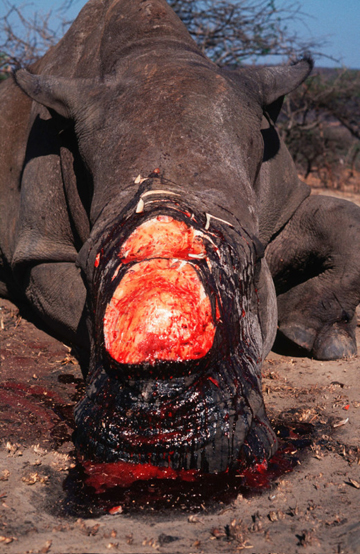South Africa has experienced an uptick in rhino poaching since Environmental Minister Edna Molewa called for legalizing the rhino trade, reveals analysis by the Environmental Investigation Agency (EIA).
The advocacy group found that an average of 3.2 rhinos more were killed each week since Molewa announced her support for establishing legal international trade in rhino horn at the Convention on International Trade in Endangered Species (CITES) in Bangkok, Thailand on March 14, 2013. The increase — from 15.4 rhinos poached each week between January 1 to March 13, 2013 to 18.6 rhinos per week between March 14 and September 19 — represents a 21 percent rise in killing.
Overall 663 rhinos have been killed in South Africa this year, just 5 short of 2012’s record. According to EIA, the number of rhinos killed in Kenya and India this year have also increased.
Indian rhino with its horn sawed off. A cut-off horn may help keep poachers away, but doesn’t guarantee it. Photo: Rhett A. Butler.
EIA — which staunchly opposes legalization of the rhino horn trade — says the numbers show that talk about legal rhino horn is incentivizing further rhino slaughter.
“South Africa is stimulating an ever-increasing and unsustainable demand for rhino horn in Vietnam, China and other countries that is fueling the rhino poaching epidemic,” said EIA President Allan Thornton in a statement. “South Africa’s policy signal to the global marketplace that rhino horn is a smart investment commodity is unleashing a tsunami of destruction on South Africa’s rhinos.”
 A white rhino killed by poachers for its horn. Photo © Martin Harvey / WWF-Canon. |
“Powerful commercial interests in South Africa are seeking to cash in on their stockpiled horn at the expense of the conservation and survival of South Africa’s rhinos,” added Mary Rice, Executive Director of EIA’s London office. “Legalizing rhino horn trade will reward the criminal kingpins behind the poaching, pushing rhinos inside and outside of South Africa ever closer to extinction.”
Rhinos are being killed primarily for their horns, which in Vietnam and China are believed to cure a range of ailments. Trade in wild animal parts — like elephant ivory, tiger parts, pangolin scales, shark fins — is booming with the rise of new class of consumers in East Asia.
Advocates of legalization argue that since the status quo seems to be failing to stop rising poaching, a strictly regulated market would encourage rhino farming and other practices that discourage illegal slaughter of wild rhinos. Opponents strongly contest that view.
EIA released the findings ahead of World Rhino Day, which takes place Sunday. World Rhino Day aims to raise awareness about the plight of Earth’s five rhino species, all of which are endangered by poaching or other threats.
Related articles